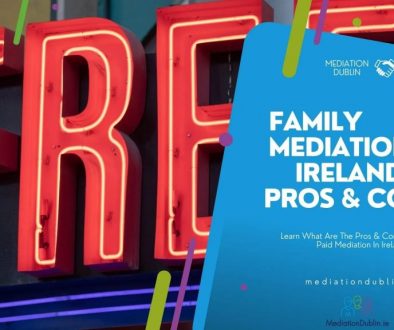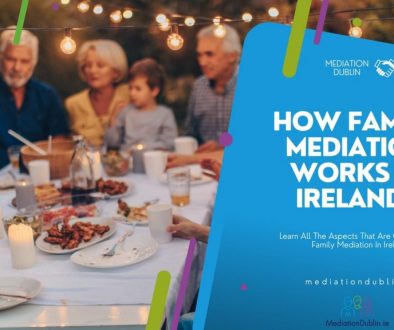How Divorce Mediation Works in Ireland?

Divorce is never an easy process, but the manner in which it’s approached can make a significant difference in the experience for all involved. Over the years, mediation has emerged as a popular alternative to traditional court litigation in Ireland. But what exactly is mediation, and how does it fit into the framework of divorce proceedings?
The Purpose of Divorce Mediation:
Mediation is essentially a structured, interactive process where an impartial third party assists disputing parties in resolving conflict. In the context of divorce, mediation serves multiple purposes:
Facilitating Communication:
Mediation provides a safe space for couples to voice their concerns and feelings without the formalities and adversarial nature of court.
Promoting Mutual Understanding:
The process aims to bridge understanding gaps and find common ground.
Cost-Effective Solution:
Traditional court proceedings can be both time-consuming and costly. Mediation often provides a faster and less expensive route to resolution.
How Mediation Differs from Traditional Divorce Proceedings?
While courtroom litigations can be contentious and focused on determining a ‘winner’, mediation is collaborative. Its primary goal is to find a solution that both parties can agree upon, emphasizing cooperation over confrontation.
The Divorce Mediation Process:
For the uninitiated, mediation might seem ambiguous. But it’s a structured process, characterized by a set formula. While the content of discussions is shaped by the couple’s unique needs, the overall approach is systematic. Here’s a breakdown:
Mediation in Ireland typically follows these steps:
Step 1: Initial Consultation and Mediator Selection:
Couples can find a mediator through referrals, online directories, or mediation service providers.
Step 2: Setting Ground Rules:
Guidelines are established for respectful communication and confidentiality.
Step 3: Discussing Issues:
Central matters, like custody arrangements, property division, and financial agreements, are discussed and negotiated.
Step 4: Reaching Agreements:
Mediators facilitate conversations to help couples reach mutual agreements.
Step 5: Documenting Agreements:
Once consensus is reached, the mediator drafts a memorandum outlining the decisions.
The Pivotal Role of Mediator in Relationship Breakdowns:
It’s vital to understand that mediators are neutral facilitators. They assist in fostering productive communication but don’t offer legal advice. Their primary role is to ensure a balanced and equitable process, making sure that both parties have an equal say.
Separating from a partner can be one of life’s most emotional and daunting challenges. This intense emotional upheaval can cloud judgment, making decisions about finances, living arrangements, and childcare even more challenging. Here’s where mediation shines:
Facilitating Co-operation:
Mediation offers a structured environment where couples can collaboratively address varied issues, from parenting responsibilities and financial support to property division and other separation-related challenges.
Establishing a Balanced Environment:
Mediators play a crucial role in ensuring an even playing field. They ensure both parties engage in the discussions without any dominance, promoting genuine cooperation.
Navigating Emotional Obstacles:
Breakups can bring out deep-seated emotions, which can obstruct logical decision-making. Mediators assist couples in navigating these emotional hurdles, paving the way for agreements that both parties deem satisfactory.
Benefits of Divorce Mediation:
Divorce mediation offers several advantages:
- Cost Savings: Mediation typically incurs fewer fees than traditional litigation.
- Faster Resolution: With cooperative parties, mediation can expedite divorce resolutions.
- Personalized Outcomes: Couples have more control over the final agreement, ensuring it suits their unique circumstances.
- Emotional Well-being: The collaborative nature of mediation can reduce the emotional toll of divorce.
Who Benefits From Divorce Mediation?
Mediation isn’t limited to a particular set of individuals. It caters to a broad spectrum, from married couples navigating the rocky terrain of separation to non-married couples looking to part ways amicably. The beauty of mediation lies in its inclusivity. Same-sex couples, parents who’ve never cohabitated but share the bond of a child, and even extended family members in certain disputes, can all benefit from this process.
The Child’s Voice in Mediation:
One of the most commendable facets of mediation is its inherent ability to factor in the voice of the most vulnerable: the children. While the adults are at the center of the dispute, it’s often the children who feel the ripple effects of decisions made during these tumultuous times.
A seasoned mediator ensures that the voice of the child is represented during mediation. By doing so, the process doesn’t just consider the desires and needs of the separating couple but also actively works towards minimizing potential harm or distress to children caught in the midst of parental conflicts.
Adaptable Parenting Plans For Chlindren After Divorce:
Change is the only constant, especially when considering the rapidly evolving needs of a growing child. What works for a toddler might not necessarily be apt for a teenager. Recognizing this, mediation provides a framework not just for immediate resolution but also for future adaptability. Parenting plans, which outline the roles, responsibilities, and arrangements for children post-separation, aren’t static documents.
As children grow, face new challenges, or as their needs change – be it due to school transitions, teenage challenges, or other milestones – these plans can be revisited. Mediators can facilitate a review of these plans, ensuring they remain relevant and effective. Such provisions for future reviews can be seamlessly incorporated into the initial mediated agreement, providing an avenue for parents to adapt to the evolving needs of their children without undergoing exhaustive renegotiations.
Potential Challenges:
Despite its many advantages, mediation might not be suitable for all. Challenges arise when one party is uncooperative or when complex financial or legal issues exceed the scope of mediation.
Legal Considerations in Ireland:
Divorce in Ireland has its legal prerequisites, and while mediated agreements can cover many aspects of the separation, they must align with Irish law. It’s advisable for couples to have their mediated agreement reviewed by independent legal counsel to ensure its validity.
As the landscape of divorce changes in Ireland, mediation offers a compassionate and effective way to navigate separation. By promoting open dialogue and professional guidance, it’s a pathway that many Irish couples are now choosing to embrace.
Time Commitment in Mediation:
Wondering about the duration? Mediation isn’t a one-size-fits-all solution. On average, couples might find themselves engaging in 3 to 6 sessions, with each lasting roughly an hour. This timeframe, however, can vary based on the complexity of issues and the willingness of both parties.
Conclusion:
In Ireland, divorce mediation is a compassionate and effective way to navigate the emotional and practical challenges of separation. By fostering open dialogue and professional guidance, it provides a pathway that many couples are choosing to embrace as they move forward with their lives after divorce.
FAQs (Frequently Asked Questions)
What is the main purpose of divorce mediation?
Divorce mediation’s primary purpose is to assist separated spouses in reaching mutually accepted solutions to issues such as parenting, economics, and property distribution without resorting to combative court processes.
Is it necessary for both parties to attend every mediation session?
Yes, both parties should be present during mediation sessions to facilitate clear communication, collaboration, and sufficient representation of all viewpoints.
Is a mediation session’s conclusion legally binding?
The outcome of the mediation, which is often memorialised in a mediated agreement, is not legally enforceable. Couples can, however, choose to have the arrangement formalised in court, which makes it enforceable.
What if we are unable to reach an agreement during mediation?
Although mediation emphasises mutual agreement, if spouses are unable to reach an agreement on particular matters, they can seek resolution via other means, including court litigation.
Can kids take part in the mediation process?
While children are not usually present during mediation sessions, their needs and concerns are crucial. Mediators frequently ensure that the child’s voice is heard, either by obtaining feedback in age-appropriate ways or by keeping the child’s best interests in mind during conversations.


